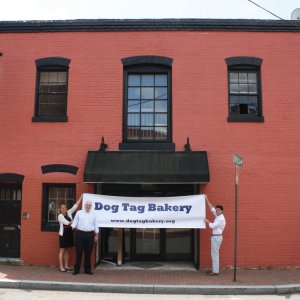
Fr. Richard Curry, S.J., founded Dog Tag Bakery with the School of Continuing Studies to prepare disabled veterans for civilian life.
The Dog Tag Bakery, an upcoming addition to the Georgetown dessert scene, will do more than serve cookies — it strives to integrate young veterans back into the workforce through a partnership with the School of Continuing Studies.
The bakery, located at 3206 Grace St. and set to open in Feburary 2014, will serve baguettes, rolls, Danishes, cookies, fudge, dog biscuits and coffee in a space staffed by veterans who simultaneously take SCS courses.
The bakery will employ veterans between the ages of 19 and 25 for four to six months as they take classes in order to earn a certificate in entrepreneurship, business and theater. Dog Tag Bakery founder Fr. Richard Curry, S.J., a Catholic Studies professor at Georgetown, said that he founded the bakery in order to help put wounded soldiers and their spouses back to work and to provide training for successful civilian life.
Curry worked with the Walter Reed National Military Medical Center and other veterans’ affairs facilities and also obtained a grant from the Coalition to Salute America’s Heroes, which will fund 12 weeks of SCS education and training for the first veteran hired at the bakery.
Curry stressed the importance of the entrepreneurial skills learned through the bakery.
“We are very excited to get the disabled veterans through our program so that they can go out and start their small businesses,” Curry said.
Georgetown University Student Veteran Association President Zachary Zimmerman (MSB ’14) added that the experience of learning and applying skills would give disabled veterans a needed boost.
“They don’t just learn a new skill as far as baking,” Zimmerman said. “That’s a hard skill, sure, but the soft skills are really going to be important — how do you run a business, what is something that an entrepreneur needs to focus on. It really gives them their own set of tools so they can get back on their feet in a self-sustaining way.”
Near the end of the employment period, the veterans will also utilize their newly learned theater skills to perform their personal stories onstage in the bakery. Curry said this was an important step in the veterans’ mental health.
“Our real goal is to re-integrate the disabled veterans so they get used to their transformation of their bodies, get them very comfortable with the public, re-integrate them into society and get them astute in business, so they can go out and get the employment that they deserve,” Curry said. “I consider the stage as important as an oven.”
Zimmerman emphasized the importance of acknowledging the mental trauma in addition to the physical difficulties that disabled veterans often face.
“You go from being able to do superhuman things to not even being able to tie your own shoes,” Zimmerman said.
Curry added that the bakery would hire Georgetown students as waiters and waitresses. The presence of local students would create a college atmosphere for the veterans and would remind students of the harsh realities of veteran sacrifice.
“I think it’s important for students to realize that fellow students their age are defending our country,” Curry said.














